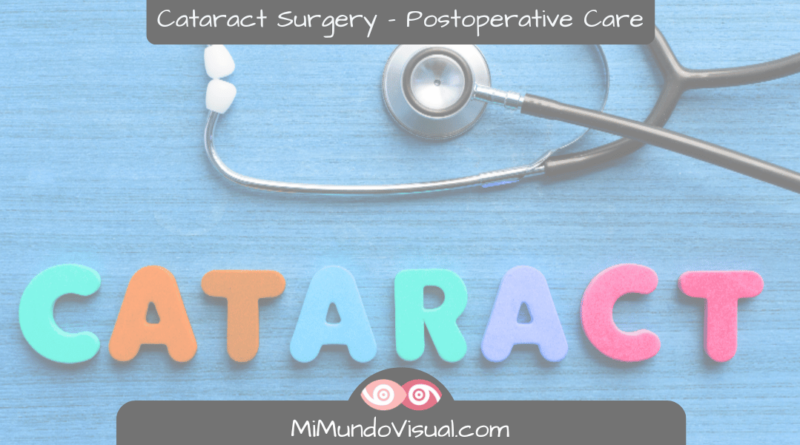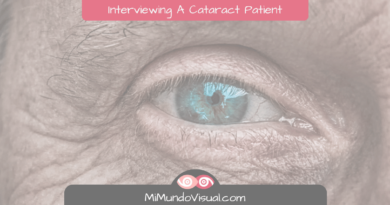6 Questions About Cataract Surgery Postoperative Care
Table Of Contents
In this article, we would like to answer some questions that we may have post-operation of cataract surgery.
- What does the eye look like after cataract surgery?
- Why is my eye blurry after cataract surgery?
- How long does it take for my vision to recover after cataract surgery?
- What to expect in the postoperative period of cataract surgery.
- How long before I can play sports after cataract surgery?
- How do I sleep after cataract surgery?
As with any postoperative period, a series of care measures and recommendations must be followed. Our ophthalmologist will outline these in due course.
Possibly one of the most frequent questions that we can ask ourselves is:
#1 What does the eye look like after cataract surgery?
After the surgery, the ophthalmologist will probably place an eye patch or eye protection and recommend that we wear the patch for a few days. You will likely have to wear this eye protection while you sleep for the first couple of days after the surgery.
In addition, he will prescribe antibiotic and anti-inflammatory drops or medications to prevent infections, control eye pressure and reduce inflammation.
After cataract surgery, it is normal to feel a stinging sensation and some discomfort in the eye for a few days. However, we should avoid pressing or rubbing the eye.
Eye recovery after cataract surgery is usually relatively quick, and it takes between 2 and 6 weeks to heal. Read more here: How is the recovery from cataract surgery at ISV Clinics, the eye can take between 2 and 6 weeks to heal.
As indicated by Mayor Clinic in its article: Cataract Surgery, total healing usually takes place in the first 8 weeks after the operation.
Do consider that each person is different, so some people already begin to notice improvement after surgery. For others, it may take several weeks.
#2 How long does it take to recover sight after cataract surgery?
After cataract surgery, as shown in Mayor Clinic, vision is usually blurry for the first few days, and colors may appear brighter. This is because the cataract is yellow or brown, which makes colors look different.
In addition, as indicated by SaludOnNet, increased sensitivity to light, glare, and dry eyes are common.
These are typical symptoms due to the fact that our visual system has to adjust after cataract extraction and adapt to the intraocular lens that replaces the crystalline lens.
However, in case of any discomfort, it is always advisable to contact the ophthalmologist since they are the right person to inform us about the evolution of our recovery after cataract surgery.
#3 Why is vision blurred after cataract surgery?
As we indicated above, your vision may be blurry during the first few days after cataract surgery.
Take into account that if we see blurry again months or years later, it is likely another issue. It does not mean we have cataracts again since they were removed.
What happens is that the posterior capsule – the sack left intact in the eye after the extraction of the crystalline lens for the placement of the intraocular lens – has become opaque due to the growth of some cells.
Treating capsular opacification and ‘cleaning the lens’ is done by laser capsulotomy.
#4 What is the cataract postoperative period like?
The cataract postoperative period, as indicated by Clínica Baviera, is usually a simple and minimally uncomfortable process, but certain precautions must be taken.
In addition, during the first stages of recovery, it is recommended to have a slow routine so that you can focus on the recovery from the operation.
As Ophtalteam points out: ‘Care after cataract surgery influences the recovery time’.
It is, therefore important to follow the guidelines set by the ophthalmologist after cataract surgery.
Some of these indications for the cataract postoperative period are:
- Do not lift weights, bend down or make a physical effort.
- Apply medication as prescribed by the ophthalmologist.
- Wear approved sunglasses as protection against the sun.
- Do not rub your eyes
- Do not wear make-up during the first days after surgery.
- Do not move your head abruptly
- Take special care not to get water or soap in the operated eye.
In addition, after cataract surgery, you cannot drive. During the first day, it is advisable to rest your eyes and not read, use the computer, watch television, or perform any activity that strains your eyesight.
The following day, more daily activities can be resumed. However, ophthalmologists recommend taking precautions to avoid suffering any injury while recovering from the intervention. Take the guidelines established for the postoperative cataract period into account at all times.
#5 When can I do sports after cataract surgery?
Although cataract surgery is a routine procedure, it is still a surgery and our eyes need time to recover.
Therefore, during the first week, it is recommended not to perform strenuous activities, as indicated in the Charlotte Eye Ear Nose and Throat Associates, P.A. (CEENTA) account, such as martial arts or sprinting, in addition to not lifting weights greater than 2 – 4 kilos.
On the other hand, at CEENTA, they advise light walking either on the street or the treadmill.
And after the first week, and always under the supervision of the ophthalmologist, we can return to most of our usual activities.
Although we will avoid lifting weights and swimming for approximately the first month after surgery.
#6 How to sleep after cataract surgery?
After cataract surgery, sleeping can be a little uncomfortable since we cannot rest on the eye that has been operated on for the first 7 days.
However, it will be possible to sleep on either side after the first week as long as your ophthalmologist approves it.
After cataract surgery, the ophthalmologist will provide us with eye protection that we should use while we sleep during the first week to protect the eye.
After cataract surgery, sleeping on your back or on the opposite side of the operated eye is recommended to avoid leaning on it.
You might be interested in…
- Color Blindness – Daltonism
- What Is A Stye And Why Do They Appear?
- 7 Questions About Myopia Answered!
- Ametropia?
- What is Computer Vision Syndrome?
- Eye Fatigue – Asthenopia – All You Need To Know!
- 4 Questions About Cataract Surgery
Download our Free Amblyopia Guide




